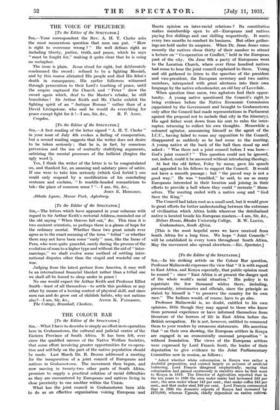THE COLOUR BAR
[To the Editor of the SPECTATOR.]
Sm,—What I have to describe is simply an effort in co-operation here in Grahamstown, the cultural and judicial centre of the Eastern Province of South Africa. It has been felt, ever since the qualified success of the Native Welfare Societies, that some effort involving greater opportunities for co-opera- tion and self-help on the part of the native population should be made. Last March Dr. R. Broom addressed a meeting for the inauguration of a joint council of Europeans and natives in Grahamstown. The movement then begun, and now moving in twenty-two other parts of South Africa, promises to supply a practical solution of racial difficulties as they are encountered by Europeans and natives living in close proximity to one another within the Union.
What has the joint coancll in Grahamstown been able to do as an effective organization -Voicing European and Bantu opinion on inter-racial relations ?• Its constitution makes Membership open to all—Europeans and natives paying five shillings and one shilling respectively. It meets every two months to conduct its business. But other gather- ings are held under its auspices. When Dr. Jesse Jones came recently the natives chose thirty of their number to attend a lecture on "Co-operation or Conflict," held in the European
part of the city. On June 9th a patty of Europeans went to the Location Church, where over three hundred natives had come to hear the joint council explained to them. Young and old gathered to listen to the speeches of the. president and vice-president, the European secretary and two native members, interpreted with great alertness into their own language by the native schoolmaster, an old boy of Lovedale.
When question time came, two Agitators had their oppor- tunity. A young native questioned the Council's right_ .to
bring evidence before the Native Economic Commission (appointed by the Government and brought to Grahamstown only after the Council had made representations in Parliament against the proposal not to include that city in the itinerary). His aged father went down from his seat to calm the inter- rupter, returning to collect his own thoughts. Meanwhile a coloured agitator, announcing himself as the agent of the I.C.U., having failed to rouse any opposition to the Council, disappeared as suddenly as he had come to the meeting. A young native at the back of the hall then stood up and asked : "Was there not a joint council before I was born— God's joint council ? " This question could not be ignored, nor, indeed, could it be answered without introducing theology.
At last the old father, Foley by name, gave his speech and appealed to his fellows to support the Council. It would not have a smooth passage ; but "the paved way is not a good way." He was "tumbled," he said, to see so many Europeans interested in their location and joining in their efforts to provide a hall where they could." recreate " them-
selves. The meeting ended with a native song and "Cod Save the King."
The Council had taken root as a small seed, but it would grow to great efforts for better understanding between the extremes of civilization which Africa holds wherever the detril3alize1 native is located beside his European masters.—I am, Sir, &c.,
[This is the most hopeful news we have received from South Africa for a long time. We hope "Joint Councils" will be established in every, town :throughout South Africa. May the movement also spread elsewhere.—En. Spectator.]


































 Previous page
Previous page